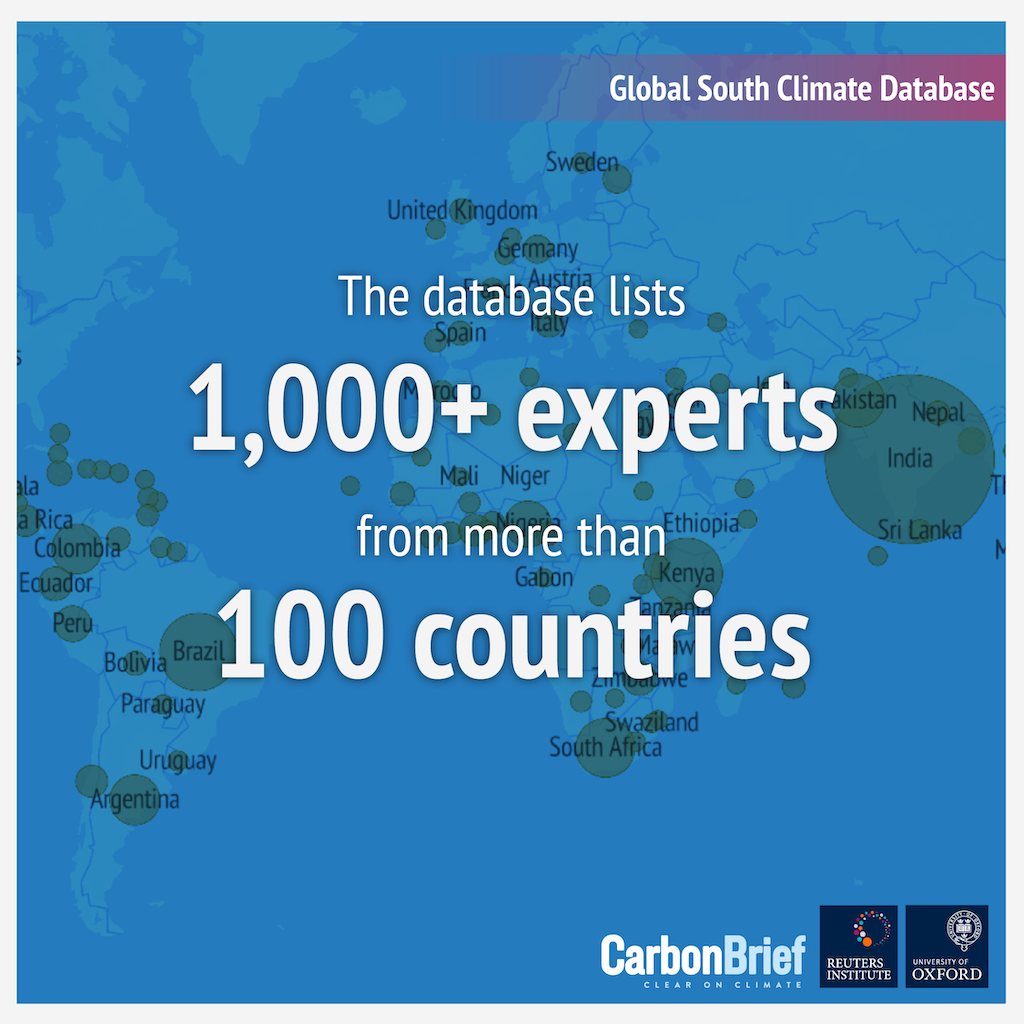
DeBriefed 3 November 2023: King at COP28; 1.5C in ‘rearview mirror’; Life of ‘climate revolutionary’ Prof Saleemul Huq
Ayesha Tandon
11.03.23Ayesha Tandon
03.11.2023 | 2:18pmWelcome to Carbon Brief’s DeBriefed.
An essential guide to the week’s key developments relating to climate change.
This is an online version of Carbon Brief’s weekly DeBriefed email newsletter. Subscribe for free here.
This week
Countdown to COP
FOSSIL PHASEDOWN: The “high ambition coalition” – a group of 15 nations including France, Spain and Kenya – has called for the phasing out of all fossil fuels at preliminary talks ahead of this month’s COP28 climate summit in Dubai, the Financial Times reported. This puts the group “at odds” with major fossil fuel producers, particularly in the Middle East, the paper added.
RENEWABLES ‘RALLY’: The EU, US and the United Arab Emirates are “rallying” other governments to join a global deal to triple renewable energy this decade at COP28, according to documents shared with Reuters. The countries are working to recruit others to sign the pledge ahead of COP28, with a launch event likely to be held at the start of the summit, it said.
PAPAL PARTICIPATION: Pope Francis has announced that he will attend COP28, becoming the first pontiff to participate in such an event, the Wall Street Journal reported. UK monarch King Charles will attend the opening ceremony, a year after he was advised by former prime minister Liz Truss’s government not to attend COP27 in Egypt, reported the Guardian. Reuters noted that US president Joe Biden is not scheduled to attend.
‘Carbon budget’ cuts
SHRINKING BUDGET: The remaining “carbon budget” for limiting global warming to 1.5C above pre-industrial temperatures has shrunk further, according to a new study reported on by BBC News. The study found that only 250bn tonnes of CO2 can be released if the planet is to have a 50% chance of staying below 1.5C, BBC News reported. The study authors revealed the reduced carbon budget in a Carbon Brief guest post last year and the new study includes small methodology updates.
COUNTDOWN: The Guardian reported that, according to the study, the remaining carbon budget will be exhausted in six years, given current levels of emissions. The UN goal of reaching net-zero by 2050 would give the planet only a 40% chance of staying below 1.5C, the paper added. New Scientist noted that, to have half a chance of limiting global warming to 1.5C, the planet would need to reach net-zero emissions by 2034.
TEMPERATURE TARGETS: Elsewhere, a separate study led by Dr James Hansen, a NASA scientist best known for his striking testimony on climate change before Congress 35 years ago, projected that the world will warm by 1.5C this decade. “The 1.5C limit is deader than a doornail,” said Hansen, according to the New York Times. The newspaper carried comments from Carbon Brief’s climate science contributor Dr Zeke Hausfather, who says: “I think everyone agrees that 1.5C is in the rearview mirror at this point.”
Adaptation gap
‘WOEFULLY INADEQUATE’: The United Nations Environment Programme has published its annual “adaptation gap” report, which found that current spending is “woefully inadequate,” according to the New York Times. The report warned that developing countries need 10-18 times more climate adaptation funding than they currently receive, the Washington Post reported.
BILLIONS NEEDED: Developing countries need $215bn-387bn per year to adapt to the impacts of climate change – a $47bn increase since last year’s assessment – the Financial Times reported. However, adaptation finance flows to developing countries declined by 15% to $21bn in 2021, leading to a finance gap of $194bn-366bn per year, according to the South China Morning Post.
‘MAJOR GAPS’: In a Carbon Brief guest post, two of the report’s authors identified the major gaps in adaptation finance and explained why they have emerged. Over 2017-21, only 66% of the allocated funds were successfully disbursed to their recipient countries, the authors estimated.
Around the world
- PRICE SPIKE: The World Bank has warned that the ongoing conflict between Israel and Hamas could drive up oil prices, Reuters reported. According to the newswire, the bank outlined three scenarios, the worst of which could see oil prices jump above $150 per barrel.
- THREE BASINS: Rainforest countries from across three continents have agreed to work together to finance and protect their ecosystems – but failed to firm up a unified alliance, Carbon Brief reported.
- WIND WOES: The world’s biggest offshore wind developer has taken a £4.6bn hit after scrapping two projects in the US due to rising costs and delays, the Times reported. The decision is a “blow” to Joe Biden’s plan to reach 30GW of offshore wind capacity in US waters before 2030, the Guardian said.
- LICENCE TO DRILL: The UK’s North Sea Transition Authority has issued 27 new oil and gas licences, the Press Association reported. The Times said the decision has attracted criticism, with Scottish first minister Humza Yousaf calling it the “wrong move”.
- INDONESIA EMISSIONS: Indonesia aims to cut CO2 emissions from its on-grid power sector to 250m tonnes by 2030 and increase its share of renewable electricity generation to 44%, Reuters reported. The plan is part of the nation’s “just energy transition partnership”.
$150bn
The amount that banks pumped into companies with “carbon bomb” projects – extraction projects that release more than one gigatonne of CO2 – in 2022, according to the Guardian.
Latest climate research
- The Denman Glacier in East Antarctica will contribute 0.33mm per year to global sea level rise until the year 2300 – a level that is “comparable to half of the contemporary sea level contribution of the entire Antarctic ice sheet” – according to new research in Science Advances.
- Forests in the Brazilian Amazon that have been disturbed by human activity have much lower resilience to heat stress and atmospheric water stress than intact forests, according to a new study in Global Change Biology.
- New research in Communications Earth and Environment found that the rise in global average surface temperature shows a consistent 50-year trend of 0.18C per decade, with an increased rate from 1990.
(For more, see Carbon Brief’s in-depth daily summaries of the top climate news stories on Monday, Tuesday, Wednesday, Thursday and Friday.)
Captured
Global South Climate Database

Carbon Brief’s Global South Climate Database, a project that aims to ensure that journalists from all over the world can contact climate experts from developing countries, recently celebrated its one-year anniversary. The database now includes 1,003 experts from 107 countries, who collectively speak more than 75 languages. Carbon Brief launched the publicly available, searchable database of climate experts from the global south in October 2022, with the support of the Reuters Institute’s Oxford Climate Journalism Network.
Spotlight

Prof Saleemul Huq: A ‘climate revolutionary’
This week, Carbon Brief profiles the life of loss-and-damage pioneer Prof Saleemul Huq.
Tributes have been flooding in from politicians, scientists and activists for Prof Saleemul Huq – the influential Bangladeshi climate scientist who died on 28 October at the age of 71.
Born in 1952 in then-East Pakistan, Huq attended university in the UK. After obtaining his PhD in biochemistry at Imperial College London, he returned to Bangladesh where he founded the Bangladesh Centre for Advanced Studies – an independent thinktank focused on environment policy.
Huq quickly became a leading voice in community-based adaptation and organised annual conferences on the topic from 2005, bringing together experts from around the world.
In 2009, Huq was appointed the director of the International Centre for Climate Change and Development (ICCAD). He also set up the climate change research group at International Institute for Environment and Development (IIED) in Bangladesh, and was its initial director – continuing as a senior fellow until 2021.
Huq was a prominent scientist. He worked as lead author on the third, fourth and fifth assessment reports of the Intergovernmental Panel on Climate Change (IPCC). He also published hundreds of papers in high-profile journals throughout his career.
The Queen awarded Huq an OBE in the 2022 New Year’s honours list for his “services to combating international climate change”. Later that year, Nature named Huq as one of its top-10 scientists, calling him a “climate revolutionary”.
Huq also played an active role in international climate negotiations. He attended every single set of UN climate talks, from COP1 in Berlin in 1995 to COP27 in Egypt, where he used his expertise to advise the least developed and most climate-vulnerable countries.
Huq was widely known for his campaign work on providing “loss and damage” funding for less developed countries. At COP27, he was front and centre when countries came to a historic agreement to set up a loss and damage fund.
“He worked tirelessly for 30 years,” Harjeet Singh, head of global political strategy at the Climate Action Network, told the Washington Post. “Despite many moments of frustration, he never lost hope.”
ICCAD has launched a petition calling for the UN loss and damage fund to be named after Huq, after the idea gained traction with many prominent voices in the climate community.
Huq was part of the advisory committee to the presidency of COP28 and had planned to attend the talks in Dubai.
In his final piece of writing, published days after his death, Huq emphasised the need to “keep pressure on the biggest emitters” at COP28. Prof Farhana Sultana, his co-author, wrote that he “was a visionary and steadfast leader on climate justice, a champion of developing countries at climate negotiations, an advocate for the global poor, and a source of inspiration to thousands worldwide”.
Huq was a “titan of the climate movement who stood out in a field dominated by scientists from Europe and North America”, said Mohamad Adow, director of energy and climate thinktank Power Shift Africa.
German climate envoy and former Greenpeace head Jennifer Morgan called Huq “a driving force for climate justice since the beginning of the climate debate”.
ICCAD called him “a visionary leader who was not only the torch bearer for Bangladesh’s fight against climate change but for the entire global community”.
On Sunday afternoon, hundreds gathered at the Gulshan Society mosque in Dhaka to pay their respects. Huq is survived by his wife, son and daughter.
Watch, read, listen
‘KILLER LAKE’: A joint investigation by the Bureau of Investigative Journalism and Reuters revealed the “preferential treatment and backroom deals” behind the Canadian winner of gas rights on Congo’s “killer” Lake Kivu.
SUN AND WIND: On her blog Sustainability by Numbers, Dr Hannah Ritchie walked through the numbers from a policy paper (pdf) published by the University of Oxford looking at the potential for solar and wind to meet the UK’s energy needs.
ECUADOR VS OIL: BBC podcast The Climate Question explored why the people of Ecuador voted to stop oil drilling in the Amazon rainforest.
Coming up
- 6-10 November: Group on Earth Observations (GEO) week 2023, Cape Town, South Africa
- 6-10 November: 52nd Meeting of the Pacific Islands Forum, Cook Islands
- 7 November: Liberia second round of presidential elections
- 10 November: IEA Energy Policy Review of Uganda, Kampala, Uganda
Pick of the jobs
- Carbon Brief, multimedia producer | Salary: £30,000 a year, dependent on experience. Location: A UK/Europe time zone
- UK Met Office, scientific manager – sea level rise | Salary: £49,149 a year. Location: Exeter
- The Nature Conservancy, policy adviser, northern Caribbean programme | Salary: BSD$53,000-58,000. Location: Bahamas
- The Stockholm Environment Institute, research fellow, climate finance | Salary: Unknown. Location: Bangkok, Thailand
DeBriefed is edited by Daisy Dunne. Please send any tips or feedback to [email protected]
-
DeBriefed 3 November 2023: King at COP28; 1.5C in ‘rearview mirror’; Life of ‘climate revolutionary’ Prof Saleemul Huq

